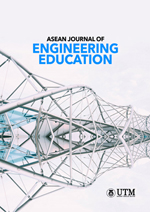Assessing the Reliability and Validity of a Survey Questionnaire for Online Laboratory Courses in Mechanical Engineering Programs
DOI:
https://doi.org/10.11113/ajee2024.8n1.148Keywords:
Survey Questionnaire Assessment, Engineering Program, Online Laboratory Course, Tertiary Education, Mechanical Engineering Academic ProgramAbstract
In Mechanical Engineering academic program, the laboratory courses were conventionally hands-on nature that requires access to specialized equipment for practical learning experience purposes. However, immediate execution of Open and Distance Learning (ODL) during the global pandemic of COVID-19 has shaped new phenomena in teaching and learning including the laboratory courses. Assessment of the potential to continue with the online approach for the laboratory courses for better accessibility, flexibility, safety, and cost-effectiveness is necessary. This study aims to assess the validity and reliability of the designed survey questionnaires in investigating the suitability of conducting Mechanical Engineering laboratory courses in tertiary education via ODL method. The laboratory courses in Mechanical Engineering programs are diverse, each focusing on different areas of the discipline such as Manufacturing Process, Engineering Workshops, Applied Mechanics, Computer Aided Design and Thermofluids. However, the question was designed to suit all the laboratory courses offered by the program. Three domains of online delivery were investigated, the course delivery method, the assessment method, and suitability of the online delivery method. The reliability and validity of the survey questionnaire were assessed through a pilot test with a minimum of thirty respondents by using Principal Component Analysis (PCA) and Cronbach Alpha (CA). The analysis is done by deploying the Statistical Package for the Social Sciences (SPSS) software. The analysis results indicate the survey questionnaires are reliable and valid, the Cronbach Alpha value of 0.928 and Kaiser-Meyer-Olkin (KMO) index of 0.81. Thus, the survey questionnaires can be disseminated at large for the actual data collection purposes.



















